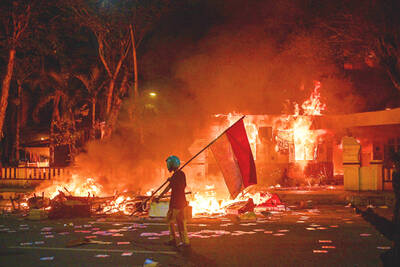Russia signed a deal on Friday to form a customs union with former Soviet neighbors Kazakhstan and Belarus.
Russian President Dmitry Medvedev invited other former Soviet nations to join the union, hailing it as a “new stage in our cooperation.”
The union will come into force on Jan. 1, with the three countries using the same foreign trade tariffs and rules with one another, though it will likely take another six months for all tariffs to be synchronized, officials said.
Russia and Belarus already have an accord calling for close political, economic and military ties. The creation of the customs underscores Moscow’s determination to shore up its influence among neighbors.
Analysts said, however, that the new deal could further stall Russia’s 16-year-old effort to join the WTO, even though Moscow has backed off from Russian Prime Minister Vladimir Putin’s announcement in June that Russia would scrap individual membership talks and insist on joining Belarus and Kazakhstan.
Russia is the largest economy outside the 153-member WTO.
Its prospects for membership are a “big mystery to everyone,” said Yevgeny Gavrilenkov, chief economist at Moscow-based Troika Dialog investment bank.
He said the new customs union means Russia’s WTO entry talks “are likely to get dragged out again.”
Friday’s deal follows numerous attempts to forge closer economic ties among ex-Soviet nations that have been stymied by deep economic differences and fears of Moscow’s domination.
Belarusian President Alexander Lukashenko called it a “big, historic step,” and Medvedev called it “a very important event.”
Gavrilenko said it would change little in practice.
“I don’t see any fundamental changes coming from this agreement,” Gavrilenkov said.
The deal “must streamline trade between the three countries somehow, but borders between Russia, Belarus and Kazakhstan are pretty transparent already.”

Australia has announced an agreement with the tiny Pacific nation Nauru enabling it to send hundreds of immigrants to the barren island. The deal affects more than 220 immigrants in Australia, including some convicted of serious crimes. Australian Minister of Home Affairs Tony Burke signed the memorandum of understanding on a visit to Nauru, the government said in a statement on Friday. “It contains undertakings for the proper treatment and long-term residence of people who have no legal right to stay in Australia, to be received in Nauru,” it said. “Australia will provide funding to underpin this arrangement and support Nauru’s long-term economic

‘NEO-NAZIS’: A minister described the rally as ‘spreading hate’ and ‘dividing our communities,’ adding that it had been organized and promoted by far-right groups Thousands of Australians joined anti-immigration rallies across the country yesterday that the center-left government condemned, saying they sought to spread hate and were linked to neo-Nazis. “March for Australia” rallies against immigration were held in Sydney, and other state capitals and regional centers, according to the group’s Web site. “Mass migration has torn at the bonds that held our communities together,” the Web site said. The group posted on X on Saturday that the rallies aimed to do “what the mainstream politicians never have the courage to do: demand an end to mass immigration.” The group also said it was concerned about culture,

ANGER: Unrest worsened after a taxi driver was killed by a police vehicle on Thursday, as protesters set alight government buildings across the nation Protests worsened overnight across major cities of Indonesia, far beyond the capital, Jakarta, as demonstrators defied Indonesian President Prabowo Subianto’s call for calm. The most serious unrest was seen in the eastern city of Makassar, while protests also unfolded in Bandung, Surabaya, Solo and Yogyakarta. By yesterday morning, crowds had dispersed in Jakarta. Troops patrolled the streets with tactical vehicles and helped civilians clear trash, although smoke was still rising in various protest sites. Three people died and five were injured in Makassar when protesters set fire to the regional parliament building during a plenary session on Friday evening, according to

CRACKDOWN: The Indonesian president vowed to clamp down on ‘treason and terrorism,’ while acceding to some protest demands to revoke lawmaker benefits Protests in Indonesia over rising living costs and inequality intensified overnight, prompting Indonesian President Prabowo Subianto to cancel a planned trip to China, while demonstrators reportedly targeted the homes of the finance minister and several lawmakers. Rioters entered Indonesian Minister of Finance Sri Mulyani Indrawati’s residence near Jakarta early yesterday, but were repelled by armed forces personnel, Kompas reported. Items were taken from the homes of lawmaker Ahmad Sahroni and two others, according to Detik.com. The reports of looting could not be independently verified, and the finance ministry has not responded to requests for comment. The protests were sparked by outrage over